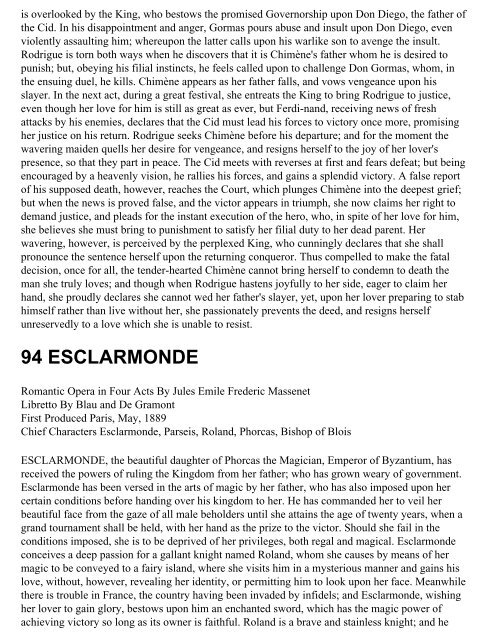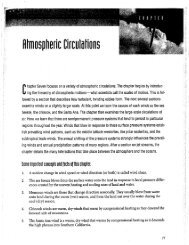Opera Plots I - MDC Faculty Home Pages
Opera Plots I - MDC Faculty Home Pages
Opera Plots I - MDC Faculty Home Pages
Create successful ePaper yourself
Turn your PDF publications into a flip-book with our unique Google optimized e-Paper software.
is overlooked by the King, who bestows the promised Governorship upon Don Diego, the father of<br />
the Cid. In his disappointment and anger, Gormas pours abuse and insult upon Don Diego, even<br />
violently assaulting him; whereupon the latter calls upon his warlike son to avenge the insult.<br />
Rodrigue is torn both ways when he discovers that it is Chimène's father whom he is desired to<br />
punish; but, obeying his filial instincts, he feels called upon to challenge Don Gormas, whom, in<br />
the ensuing duel, he kills. Chimène appears as her father falls, and vows vengeance upon his<br />
slayer. In the next act, during a great festival, she entreats the King to bring Rodrigue to justice,<br />
even though her love for him is still as great as ever, but Ferdi-nand, receiving news of fresh<br />
attacks by his enemies, declares that the Cid must lead his forces to victory once more, promising<br />
her justice on his return. Rodrigue seeks Chimène before his departure; and for the moment the<br />
wavering maiden quells her desire for vengeance, and resigns herself to the joy of her lover's<br />
presence, so that they part in peace. The Cid meets with reverses at first and fears defeat; but being<br />
encouraged by a heavenly vision, he rallies his forces, and gains a splendid victory. A false report<br />
of his supposed death, however, reaches the Court, which plunges Chimène into the deepest grief;<br />
but when the news is proved false, and the victor appears in triumph, she now claims her right to<br />
demand justice, and pleads for the instant execution of the hero, who, in spite of her love for him,<br />
she believes she must bring to punishment to satisfy her filial duty to her dead parent. Her<br />
wavering, however, is perceived by the perplexed King, who cunningly declares that she shall<br />
pronounce the sentence herself upon the returning conqueror. Thus compelled to make the fatal<br />
decision, once for all, the tender-hearted Chimène cannot bring herself to condemn to death the<br />
man she truly loves; and though when Rodrigue hastens joyfully to her side, eager to claim her<br />
hand, she proudly declares she cannot wed her father's slayer, yet, upon her lover preparing to stab<br />
himself rather than live without her, she passionately prevents the deed, and resigns herself<br />
unreservedly to a love which she is unable to resist.<br />
94 ESCLARMONDE<br />
Romantic <strong>Opera</strong> in Four Acts By Jules Emile Frederic Massenet<br />
Libretto By Blau and De Gramont<br />
First Produced Paris, May, 1889<br />
Chief Characters Esclarmonde, Parseis, Roland, Phorcas, Bishop of Blois<br />
ESCLARMONDE, the beautiful daughter of Phorcas the Magician, Emperor of Byzantium, has<br />
received the powers of ruling the Kingdom from her father; who has grown weary of government.<br />
Esclarmonde has been versed in the arts of magic by her father, who has also imposed upon her<br />
certain conditions before handing over his kingdom to her. He has commanded her to veil her<br />
beautiful face from the gaze of all male beholders until she attains the age of twenty years, when a<br />
grand tournament shall be held, with her hand as the prize to the victor. Should she fail in the<br />
conditions imposed, she is to be deprived of her privileges, both regal and magical. Esclarmonde<br />
conceives a deep passion for a gallant knight named Roland, whom she causes by means of her<br />
magic to be conveyed to a fairy island, where she visits him in a mysterious manner and gains his<br />
love, without, however, revealing her identity, or permitting him to look upon her face. Meanwhile<br />
there is trouble in France, the country having been invaded by infidels; and Esclarmonde, wishing<br />
her lover to gain glory, bestows upon him an enchanted sword, which has the magic power of<br />
achieving victory so long as its owner is faithful. Roland is a brave and stainless knight; and he













